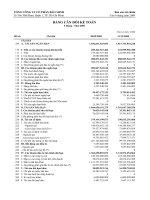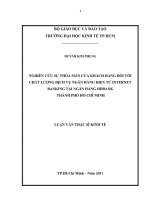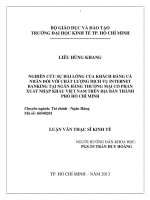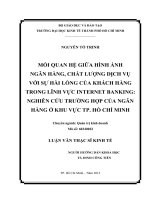Lecture Computer literacy - Lecture 26: Communication through internet - TRƯỜNG CÁN BỘ QUẢN LÝ GIÁO DỤC THÀNH PHỐ HỒ CHÍ MINH
Bạn đang xem bản rút gọn của tài liệu. Xem và tải ngay bản đầy đủ của tài liệu tại đây (698.15 KB, 10 trang )
<span class='text_page_counter'>(1)</span><div class='page_container' data-page=1>
Communication Through
Internet
ADE100- Computer
Literacy
</div>
<span class='text_page_counter'>(2)</span><div class='page_container' data-page=2>
Knowledge test
•
What do you understand by
<i>Sign up</i>
?
•
What is the purpose of
<i>Sign in</i>
?
•
How folders are attached in the email?
•
What is the functionality of
<i>Compose</i>
option in the
mail box?
</div>
<span class='text_page_counter'>(3)</span><div class='page_container' data-page=3>
Topics covered
•
Using web 2.0
•
Using chat/talk applications
• Skype, Google Talk, etc.
</div>
<span class='text_page_counter'>(4)</span><div class='page_container' data-page=4>
Web 1.0
•
<i><b>Web 1.0</b></i>
• Refers to an early stage of the WWW evolution
• Content creators were few in Web 1.0 with the vast
majority of users simply acting as consumers of content
• <i><b>Personal web pages </b></i>were common, consisting mainly of
static pages hosted on ISP-run servers, or on free
hosting services such as Geocities.
</div>
<span class='text_page_counter'>(5)</span><div class='page_container' data-page=5>
Web 2.0
•
<i><b>Web </b></i>
<i><b>2.0</b></i>
, a phrase coined by
<i><b>O'Reilly Media</b></i>
in
2004,
• Refers to a perceived second-generation of Web-based
services such as
• <i><b>Social networking sites, wikis, communication tools, </b></i>
<i><b>and folksonomies</b></i>
• That emphasize online collaboration and sharing among users.
</div>
<span class='text_page_counter'>(6)</span><div class='page_container' data-page=6>
Web 1.0 & web 2.0
<i><b>Web 1.0</b></i>
•
MP3 (Pre-IPod)
•
Britannica online
•
Personal websites
•
Documentation
•
Directories
(taxonomy)
•
Stickiness
<i><b>Web 2.0</b></i>
•
IPods
•
Wikipedia
•
Blogs
•
Wikis
•
Tags (folksonomy)
•
Syndication
(marketing)
</div>
<span class='text_page_counter'>(7)</span><div class='page_container' data-page=7>
Shared pictures
Shared videos
Shared news/podcasts
Shared knowledge
Shared bookmarks
Shared projects
Shared ‘you’
Shared library
Shared virtual life
</div>
<span class='text_page_counter'>(8)</span><div class='page_container' data-page=8>
The Challenge
•
Schools and teachers must update their learning
methods to include
• the use of ICT, web 2.0 technologies, social media and
mobile computing.
</div>
<span class='text_page_counter'>(9)</span><div class='page_container' data-page=9>
The reaction
•
How do schools & teachers react to this challenge?
•
<i><b>Schools</b></i>
• Ask for more money to buy computers.
• Register a Facebook page.
• Tell teachers that they have to learn ICT and use it in
class.
• Make rules for the use of ICT in class.
•
<i><b>Teachers</b></i>
• Ask for time off to update their ICT-competence.
• Register a Facebook page and a Twitter account
</div>
<span class='text_page_counter'>(10)</span><div class='page_container' data-page=10>
How teachers meet the
challenge?
</div>
<!--links-->
thực trạng quản lý giáo dục mầm non qua mạng internet ở thành phố hồ chí minh
- 134
- 4
- 6








